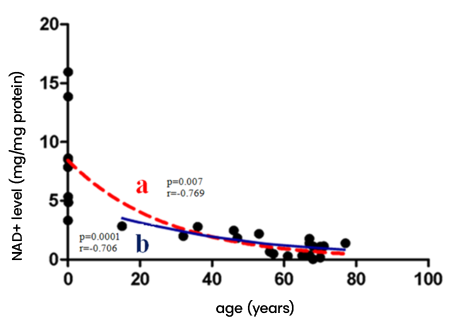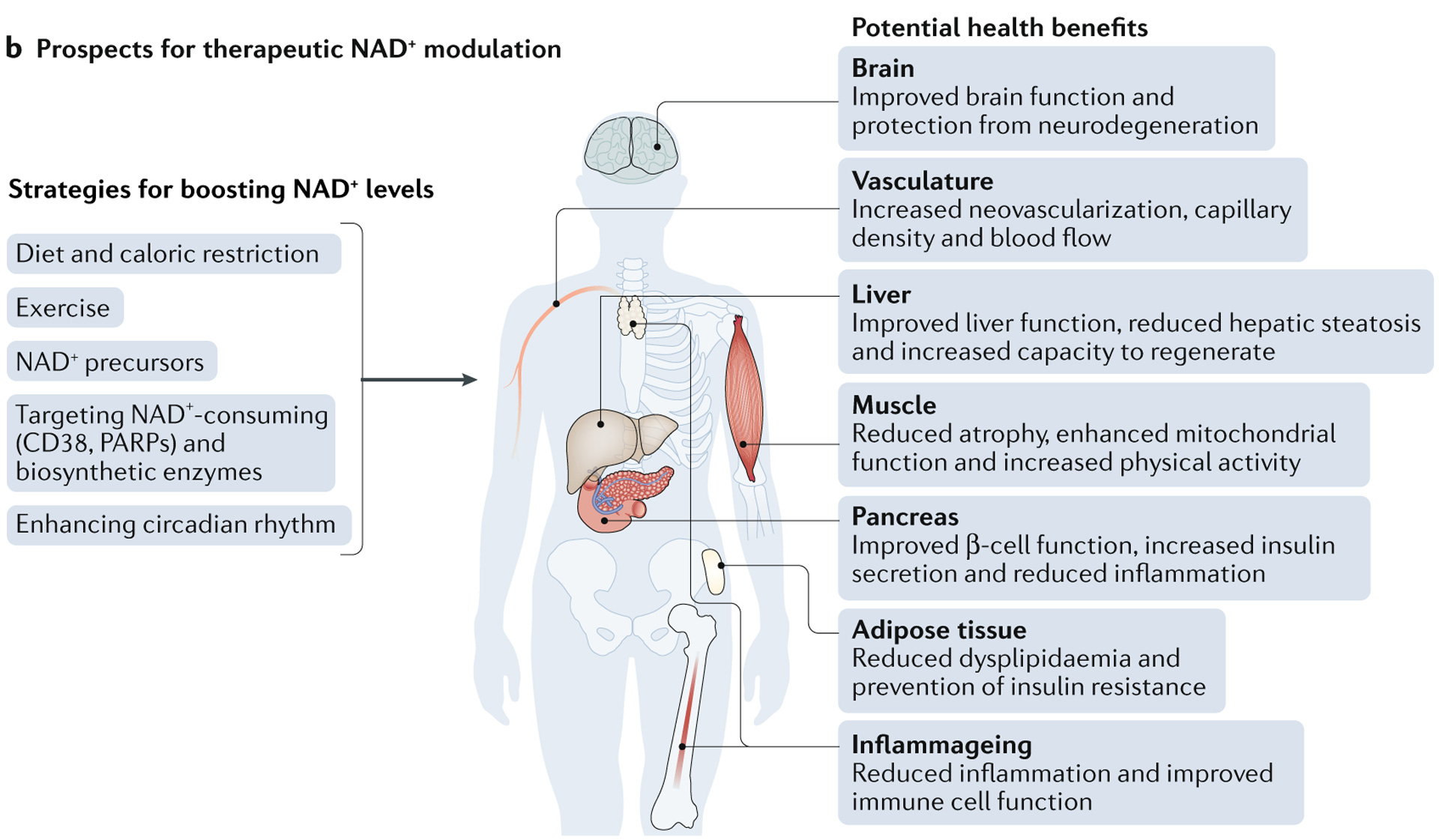What is NAD+ and what is its significance?
Nicotinamide Adenine Dinucleotide, i.e. NAD+, is a coenzyme molecule that plays an important role in cell metabolism, without which we could not live. In addition to energy transport, NAD+ is also necessary for the creation of energy-storing ATP molecules, but it also participates in many biochemical processes, such as the regulation of the sleep-wake cycle or the repair of damaged DNA.

The close connection between the level of NAD+ in the body and health was already noticed a hundred years ago. In 1937, Conrad Elvehjem discovered that the disease pellagra (characterized by dermatitis, diarrhea and dementia) was caused by a low intake of niacin, resulting in low levels of NAD+ and NADP+. Lower NAD+ levels are also known to be associated with aging in rodents and humans. As a result, there has been a renewed interest in how NAD+ metabolism affects problems in old age. In this regard, restoration of NAD+ levels with NAD+ precursors, nicotinamide riboside (NR), has emerged as an important therapeutic approach for potential treatment of aging-related problems.
NAD+ metabolism in cells
NAD+ is concentrated in the cytoplasm, mitochondria and nucleus of cells and participates in the energy-generating metabolic processes of cells. Since NAD+ primarily provides the energy for the functioning of enzymes important in terms of life processes, the presence of the right amount of NAD+ is extremely important for cells. The production and biosynthesis of NAD+ takes place in cells based on two separate mechanisms. On the one hand, in a de novo way from the essential amino acid called tryptophan, which is mainly found in foods such as meat, cheese and eggs. In this way, primarily liver cells and, under certain conditions, immune cells are able to produce NAD+. Cells are also able to synthesize NAD+ from vitamin derivatives such as Nicotinamide Riboside (NR) through the other so-called “rescue pathway”.

NAD+ and aging
Over the course of our lives, our bodies are exposed to many harmful influences that can damage DNA. As we age, these injuries accumulate, which can have serious consequences for cell function and can even lead to malignant cell changes or cell death. However, DNA damage triggers repair mechanisms that activate an enzyme called PARP. This enzyme uses NAD+ to repair DNA. The so-called sirtuin proteins also play an important role in protecting cells from DNA damage and also consume a lot of NAD+ during their operation. This can cause NAD+ levels to become depleted over time, which can lead to many problems as we age. Another such process that contributes to lowering NAD+ levels is increased immune system function. In chronic inflammatory diseases, the immune system also requires more energy, so the use of NAD+ increases.

Possibilities and advantages of NAD+ supplementation
Possible strategies to increase NAD+ levels include lifestyle changes such as introducing regular exercise, reducing calorie intake, developing healthy eating habits, and maintaining a daily circadian rhythm pattern with healthy sleep patterns and meal times. Another approach is the use of small molecule inhibitors or activators to improve NAD+ biosynthesis and nutritional supplements, including NAD+ precursors such as nicotinamide riboside (NR). All of these methods help increase NAD+ levels in tissue and can have positive effects on health. These include improved tissue and organ function, protection against cognitive decline, improved metabolic health, reduced inflammation and increased physiological benefits such as increased physical activity.

What is NAD+?
Nicotinamide adenine dinucleotide or NAD+ is a coenzyme molecule that plays an important role in cellular metabolism, a component of our bodies so important that we could not live without it.
It plays a role in energy transport, regulating the sleep-wake cycle, and repairing damaged DNA, among other functions, but lower levels of NAD+ are also associated with aging in people.
The development of MyCellen is a product to maintain NAD+ levels. A pack of MyImmuNAD+ contains 30 capsules, which corresponds to a monthly dose. It is recommended to take one capsule per day regularly in the morning to maintain appropriate NAD+ levels in the body.

MyImmuNAD+ capsule
The MyImmuNAD+ dietary supplement contains Nicotinamide Riboside (NR), Vitamin D3, Resveratrol and Coenzyme Q10:
Packaging: 30 capsules
